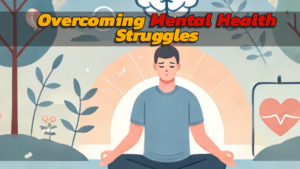In today’s digital age, screen time has become an integral part of our lives. Whether it’s social media, work, or leisure activities, screens dominate our day-to-day routines. While technology offers endless opportunities, it can also negatively impact our mental health, productivity, and focus—especially when overused. Many, like you, may also struggle with the challenges of screen addiction, including specific issues such as porn addiction. This guide offers practical strategies and insights to help you regain control over your screen habits and improve focus.
Understanding Screen Addiction
Before diving into solutions, it’s important to understand why we become hooked on screens. Our devices, especially through social media and streaming platforms, are designed to trigger dopamine releases, giving us instant gratification. This immediate pleasure can make it harder to stop once we start scrolling, leading to a cycle of compulsive behavior. Porn addiction adds another layer, feeding into the same dopamine loop but with even more intense emotions.

Strategies to Reduce Screen Time and Improve Focus
1. Set Clear Boundaries with Technology
- Establish Screen-Free Zones: Designate areas in your home, such as the bedroom or dining room, as screen-free zones. This helps to create physical boundaries and reduce temptation.
- Time Blocking: Use time blocks for social media or entertainment. Set a limit of, for example, 30 minutes in the evening, and stick to it.
2. Utilize Screen Time Monitoring Apps
- Apps like Forest, Moment, or even built-in tools like Digital Wellbeing on Android and Screen Time on iPhones allow you to track and limit your screen usage. Being aware of how much time you’re spending on certain apps can motivate change.
3. Practice Mindful Consumption
- Ask Why Before Scrolling: Every time you open social media, ask yourself, “Why am I doing this? What do I expect to get out of it?” This simple check helps reduce mindless consumption.
- Scheduled Breaks: For every 50 minutes of screen time, take a 10-minute break to stretch, meditate, or just breathe.
4. Tackle Porn Addiction with a Plan
- Accountability Partners: Share your goal with a trusted friend or partner to stay accountable. There are also communities like NoFap, where individuals support each other in overcoming porn addiction.
- Replace the Habit: Find healthier alternatives to fill the time you would otherwise spend on pornography. Exercise, meditation, or learning a new skill can help.
- Block Access: Use apps like Covenant Eyes or BlockerX to restrict access to adult content. This can help you avoid temptation when you’re feeling vulnerable.
5. Engage More with Real-Life Activities
- Find Offline Hobbies: Rediscover old hobbies or develop new ones, such as reading, painting, or gardening. These activities can re-engage your creativity and bring fulfillment outside the digital world.
- Exercise Regularly: Physical activity not only boosts mental health but also reduces the urge to turn to screens as an escape.
- Reconnect Socially: Plan in-person meetups with friends and family. Real-life interactions can greatly reduce the allure of social media.
6. Set a Sleep Routine
- Power Down Before Bed: Avoid screens at least 30 minutes to an hour before sleeping. Exposure to blue light from screens reduces melatonin production, making it harder to fall asleep and negatively affecting focus the next day.
7. Develop a Strong Morning Routine
- No Phones in the First Hour: Instead of diving into social media or emails, spend your first waking hour reading, exercising, or journaling. This helps you begin the day with purpose and focus, setting the tone for the rest of the day.
11 Inspirational Quotes to Stay Motivated
- “You don’t have to control your thoughts; you just have to stop letting them control you.” – Dan Millman
- “Almost everything will work again if you unplug it for a few minutes, including you.” – Anne Lamott
- “Focus on being productive instead of busy.” – Tim Ferriss
- “The difference between successful people and really successful people is that really successful people say no to almost everything.” – Warren Buffett
- “We don’t realize that, somewhere within us all, there does exist a supreme self who is eternally at peace.” – Elizabeth Gilbert
- “It’s not the load that breaks you down, it’s the way you carry it.” – Lou Holtz
- “Our attention is the most powerful tool of the human spirit.” – Lewis Howes
- “Simplicity boils down to two steps: Identify the essential. Eliminate the rest.” – Leo Babauta
- “Don’t let the noise of others’ opinions drown out your own inner voice.” – Steve Jobs
- “Sometimes, we need to unplug to reconnect with ourselves.” – Unknown
- “The chains of habit are too light to be felt until they are too heavy to be broken.” – Warren Buffett
38 FAQs on Reducing Screen Time and Improving Focus
- What are the best apps to reduce screen time?
- Apps like Forest, Freedom, and Moment help monitor and limit screen usage.
- How can I limit social media usage without deleting it?
- Set specific time blocks, mute notifications, and use screen time limits built into your phone.
- Is digital detox necessary for everyone?
- Not necessarily. Small, consistent efforts to reduce screen time can be more sustainable.
- Can reducing screen time improve mental health?
- Yes, less screen time can reduce anxiety, stress, and improve sleep.
- How does screen time affect focus?
- Constant switching between tasks on screens can weaken your ability to concentrate.
- How to break the habit of mindless scrolling?
- Be intentional with screen use, set clear goals, and ask yourself why you’re scrolling.
- Why is it so hard to reduce screen time?
- Dopamine released during screen use can create addictive behaviors, making it harder to stop.
- What’s the role of dopamine in screen addiction?
- Dopamine is released during screen time, leading to a reward-seeking loop.
- Does screen addiction affect sleep?
- Yes, blue light exposure from screens disrupts melatonin production and sleep cycles.
- How can I improve focus after reducing screen time?
- Practice mindfulness, establish a strong morning routine, and engage in offline activities.
- Can limiting screen time improve productivity?
- Absolutely, less time spent on distractions leads to more focused work.
- Are screen time limits effective?
- Yes, they serve as reminders and help create boundaries.
- How can I limit screen time for my kids?
- Set family rules for screen time, use parental controls, and encourage outdoor play.
- What are physical effects of too much screen time?
- Eye strain, headaches, and sleep problems are common.
- How does screen time affect relationships?
- Excessive screen use can lead to neglect of real-life relationships.
- Is social media the main cause of screen addiction?
- It’s one of the major contributors, but other apps, like streaming services, also play a role.
- Should I go on a complete digital detox?
- It depends on your needs. Gradually reducing usage may be more sustainable than a full detox.
- Does reducing screen time boost creativity?
- Yes, less screen time opens up mental space for creative thinking.
- How can I break the cycle of social media addiction?
- Limit notifications, set time limits, and find offline hobbies to engage with.
- Can limiting screen time reduce anxiety?
- Yes, as it lowers exposure to constant stimuli and comparison-driven content.
- What are some offline activities to replace screen time?
- Reading, exercising, crafting, or spending time with loved ones.
- How can I break porn addiction?
- Use blockers, seek therapy, find accountability partners, and replace the habit with healthier activities.
- Is it possible to completely overcome porn addiction?
- With the right support and strategies, overcoming it is absolutely possible.
- Does screen time affect attention span?
- Yes, excessive screen use can make it harder to focus for long periods.
- Can meditation help reduce screen addiction?
- Yes, it enhances mindfulness and helps break compulsive behavior patterns.
- How does blue light affect our sleep?
- It reduces melatonin production, making it harder to fall asleep.
- What role does exercise play in reducing screen addiction?
- Physical activity releases endorphins and reduces the need for dopamine hits from screens.
- How do I stop checking my phone first thing in the morning?
- Keep your phone away from your bed and establish a morning routine that doesn’t involve screens.
- What’s the best way to track screen time?
- Use screen time tracking apps like Moment or built-in phone features.
- How can I encourage screen limits in my workplace?
- Implement no-screen meeting times and promote the use of productivity apps that limit distractions.



